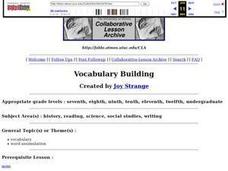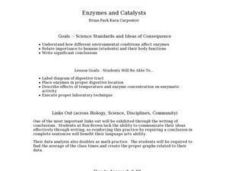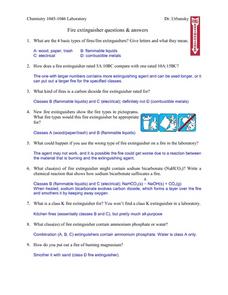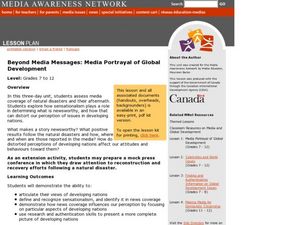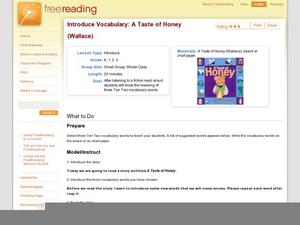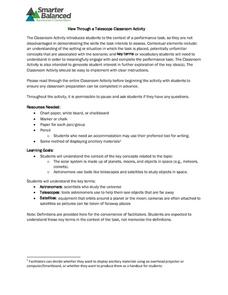Curated OER
What's So Bad or Good About Conflict?
Learners of all ages discuss how conflict can be negative and positive. First, they create a class bulletin board about conflict, and provide their thoughts and connotations surrounding the word. In a class discussion, they ask questions...
Curated OER
Vocabulary Building - Declaration of Independence
Young scholars read the first part of the Declaration of Independence and mark the words they don't know. First, they try to guess what the words mean by looking at the them in context, and then they look up the words in a dictionary.
Curated OER
Character Traits
Sixth graders explore details from a story to develop ideas and opinions about character traits. Using a Smart Board, 6th graders create a chart explaining the character's action and traits. In groups, students discuss and describe...
Curated OER
Voting and Elections: Vote to Make a Difference
Students use a ballot to make a choice about two items to vote on. In this voting lesson plan, students discuss comparing choices between two items, the benefits and drawbacks to each, and make tally marks to total the votes.
Curated OER
How Do You Get to School?
Third graders talk about all the various ways they get to school. They make a list of all the bus numbers that the students use. They also list all the other methods of transportation used and solidify a hypothesis.
Curated OER
Making an Illustrated Dictionary with Geographic Terms
Students, in groups, explore geographic terms using left and right brain activities.
Curated OER
Talking Trash
Define vocabulary related to global waste. Creative thinkers review and illustrate terms for the Global Garbage Picture Dictionary. They play a vocabulary game in which co-operative skills among players in encouraged. A great way to...
Curated OER
Enzymes and Catalysts
Pupils discuss the functioning of the digestive system and the specific enzymes present. They observe the action of amylase on starch to identify characteristics of enzymes then perform an experiment on the effects of temperature on...
Curated OER
Connotation in Propaganda
High schoolers assess persuasive techniques in propaganda. They identify and critique rhetorical devices in primary source documents (sources are not specified, but links to sites that contain various documents are included). Groups make...
Curated OER
Chemistry of Fire
In this science worksheet, students are involved in questions about the events that cause and sustain fires. The chemistry of fire is the primary focus.
Curated OER
Which Falls Faster?
Second graders study force and what it does. In this motion lesson students complete a demonstration on force and gravity and share their ideas.
Curated OER
Beyond Media Messages: Media Portrayal of Global Development
Students discuss global development and create a graphic representation of the discussion. In this media analysis lesson, students deconstruct disaster coverage by reading articles and identifying missing information. Students research...
Curated OER
Story Retelling
Students explore storytelling by participating in an image analysis activity. In this story structure lesson, students read the book Cookie's Week by Tomie dePaola and retell the story to their teacher in sequential order. Students...
Curated OER
Introduce Vocabulary: Clap Your Hands
Read Clap Your Hands to explore new vocabulary with your class. In this three-tiered vocabulary lesson plan, youngsters read the book and identify the plot, setting, and characters. They also define vocabulary terms from the book and...
Curated OER
Introduce Vocabulary: I Hate To Be Sick
Engaged in a read aloud, kids use the story to define new vocabulary words, raising their hands when they hear new words in the story. Additionally, individuals refer to the text to show how the word was used in context. Vocabulary words...
Curated OER
Introduce Vocabulary: A Taste of Honey (Wallace)
A Taste of Honey offers learners a chance to practice with unknown words and context clues. Choose several vocabulary words to focus on as you read the picture book, or use the ones provided here. Pre-teach the words and have scholars...
Curated OER
Introduce Vocabulary: Peter's Chair (Keats)
A new baby means a lot of changes for Peter! Ezra Jack Keats presents this common childhood experience in his story Peter's Chair, the context of a detailed vocabulary study. Before you read, introduce the three new words scholars will...
Curated OER
What Does Success Mean to Me?
One can't set goals until he knows what he needs to feel successful. Learners discuss what they believe it means to be successful. They then fill out a graphic organizer showing four different paths to a successful adult life.
San Bernardino Co. Supt. of Schools
Was Julius Caesar a Good Leader for Rome?
Learners consider the various perspectives that different groups in Roman society may have had for Julius Caesar, such as Roman soldiers, senators, the working class, and slaves. The primary activity involves a reading of Caesar's...
Smarter Balanced
View Through a Telescope
Preparing for an assessment? Here's an activity that will ensure that all class members have the background knowledge they need to demonstrate their skills on a performance task related to the solar system and the tools astronomers use...
Curated OER
Picture Frame Craft
Use craft sticks to make a picture frame for parents. A great activity that can be themed for many occasions.
Curated OER
Text as Object and Art: Aesthetic Impact on Audience Reception of Books in the Early Renaissance and Today
Tenth graders examine the role that aesthetics play in the publication of books. In groups, they apply the concept of physical affectation on each reader's experience to literature. They also compare and contrast the varied types of...
Curated OER
Prime and Composite Numbers - Kenwood Academy
Learners investigate prime and composite numbers. They use a number chart and cross out multiples of 2,3,5 etc. up to 100. Pupils fold pieces of masking tape around pennies and label them with composite numbers, then fold masking tape...
Curated OER
Using Manipulatives to Teach Fractions
There is no doubt that learners remember what they have learned when they have a visual representation. Using an egg carton and candy bars, they explore the concept of fractional amounts. By having pupils cut the egg carton into parts...



